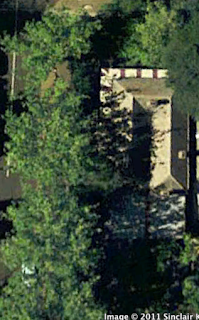I recently investigated the University of Melbourne website http://www2.smartgardenwatering.org.au/ and was very impressed by the quality of the user interface and visually pleasing layout. All the links were well set out and easy to follow making using the site a real pleasure.
I applied the details of my garden to its water usage calculator and was surprised at how many factors it took into account. It considered such inputs as plant and tree species planted, mulching type, watering method, slope of area, soil type, tank water use as well as many others. However there were some factors that I think should have been taken into account.
 For example an input missing from the calculation was the surrounding trees that are close by but not actually situated on the watering area. Where I live there are full-grown plane trees (Platanus X acerifolia) that line my side of the street. Their root systems span a very wide area and often cross over into private gardening spaces. They have the potential to suck up a lot of moisture and cause the soil to become very sandy and dry. The effect of the plane trees is made obvious by the stark contrast of the other side of the street. Opposite my side grow newly planted plane trees on nature strips that are lush and green unlike the patchy and brown nature strips on my side.
For example an input missing from the calculation was the surrounding trees that are close by but not actually situated on the watering area. Where I live there are full-grown plane trees (Platanus X acerifolia) that line my side of the street. Their root systems span a very wide area and often cross over into private gardening spaces. They have the potential to suck up a lot of moisture and cause the soil to become very sandy and dry. The effect of the plane trees is made obvious by the stark contrast of the other side of the street. Opposite my side grow newly planted plane trees on nature strips that are lush and green unlike the patchy and brown nature strips on my side. The other data entry the website didn’t consider, which I think could be a possible contributing factor to the overall watering requirement, is the surrounding surfaces with no planting. For example a paved area that drains rainwater into a gutter takes away a percentage of the yearly rainwater. This is water that doesn’t get absorbed into the soil and therefore could increase the watering requirement for the garden.
I also had a look at some of the other gardens on display through the site. It was interesting to see how some gardens are designed so that they don’t even need irrigation during the cooler months and only require watering for one or two months a year. I thought it would be interesting to see if some of the smart gardens were using any other techniques in order to save water or if there was any missing information that could be useful for other gardeners.
Despite these few points this website is one of the best I have ever used. Anyone looking to establish a garden or make an existing garden more water efficient can benefit hugely from this site. It shows people factors they otherwise wouldn’t have taken into account in an easily accessible and quick way. This site has the potential to have a real impact on the way we design gardens and on the environment.

Great point about the large Plane Trees being nearby!
ReplyDelete